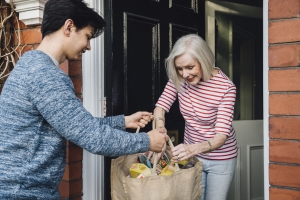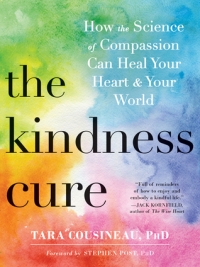How to Start a Kindness Revolution
A new book explains how to boost kindness in the world, and why that would make life better for us all.
Kindness. That’s a word we don’t hear a lot these days. Perhaps it seems antiquated in our competitive, social-media-infused, politically contentious culture—reserved for fools and chumps, not for those who want to get ahead.
But nothing could be further from the truth, according to Tara Cousineau, researcher and author of the new book The Kindness Cure. In today’s world, she argues, we need to cultivate kindness more than ever—not only for the sake of our society, but for our own well-being.

Cousineau points out that we are wired for kindness—that it’s part of our biological heritage, designed to help us foster relationships, work together, and survive in groups. When we are kind to others, it releases neurochemicals in our bodies that increase trust and give us a warm feeling.
Research suggests that being kind toward others is associated with better and stronger mental and physical health, relationships, life satisfaction, communities, and even economies, writes Cousineau. Her book points to some of the research behind these claims, but it is mainly a how-to on starting a kindness revolution—and overcoming barriers to kindness.
Because let’s face it: It can be hard to be kind, particularly when we’re stressed out or emotionally spent. I know when I’m overwhelmed I often forget to notice the people around me or be empathic to their suffering—sometimes withdrawing from them or, worse, lashing out at them. This kind of reactive behavior tears at the fabric of our relationships—at the interpersonal, workplace, and even societal level—making it harder to feel good and to accomplish common goals.
So, how does Cousineau suggest we remember to practice the Golden Rule? Here are just a few of her most helpful ideas.
Reset your stress
When you are feeling stressed, your body is flooded with neurochemicals that prepare your internal alarm system for fight, flight, or freezing. Obviously, all of these act against your desire to reach out and be kind to others.
So it’s important to soothe yourself when you are feeling stress. That could mean doing some slow, easy stretching, practicing breathing meditation, taking a walk in the woods, or spending time petting your dog. It could mean talking to a friend or getting a hug from a loved one. When you soothe your psyche with these self-care practices, you will be able to more readily be kind to others.
For me, self-care means planning a mid-afternoon stroll—if only for 10 minutes. Because writing for Greater Good can make me lose track of time, I like to set an alarm on my phone to remind myself to take a break. It’s amazingly stress-relieving, and I always come back to my desk feeling refreshed.
Practice awareness
When we’re rushed, we often tune out what’s happening around us. You need only think of the famous study in which divinity students who were trying not to be late to their next class passed right by someone in clear distress—despite just having practiced a talk on the Good Samaritan parable from the Bible! They just didn’t see that person.
To be kind, we need to learn to stop, pay attention, and practice empathy for others. Mindfulness meditation is one way to foster these skills.
By deliberately attending to the sensations in our bodies, our thoughts, and what’s happening in our environment, without judgment, we can use mindfulness practice to become more open to our current experience and strengthen the skills of attention. It can also help us to become more attuned to our emotions, which, in turn, helps us to be empathic toward others. And certain forms of meditation—like metta meditation, in which you express loving-kindness for people outside of your own circle of care—seem to increase compassion.
I began a mindfulness practice a couple of years ago, and I do feel it has helped me be kinder. For example, I recently had the urge to snap at my son, who’d texted me that he needed a ride home from an event that was running two hours late. By stopping and noticing my feelings of anger and the thoughts I was having—He’s not being considerate! I’m not a chauffeur!—I was able to see that my reaction was overblown. I avoided sending a blaming text, and we had a warm conversation about his conference experience. Relationship preserved!
Use positive conditioning
We are naturally conditioned to pay attention to the negative things happening around us. Media headlines take advantage of that predisposition, leading with sensational stories bound to make us feel enraged, fearful, helpless, or all of the above. And those emotions are antithetical to kindness.
 The Kindness Cure (New Harbinger Publications, 2018, 240 pages)
The Kindness Cure (New Harbinger Publications, 2018, 240 pages)
We need to counter that by purposefully creating opportunities for positive emotion. That could mean something as simple as smiling at the people you pass on the street, or giving your child a warm hug when you walk in the door.
In fact, being kind will likely fill you with warm feelings in the moment—so it can be a gateway to even more kindness. And you can augment those feelings by learning to savor them—either then or later on—by reflecting on your experiences. As Rick Hanson has pointed out, savoring the positive helps re-train our brains, making it easier to act with kindness in the future—even if the kindness is toward ourselves.
This, I admit, is sometimes hard for me to do. I tend to see kindness toward others as part of being a good human, not a way to improve my own happiness. But one thing that helps me is writing in my journal at the end of the day, zeroing in on moments of kindness and what they meant to me. Doing so deepens those positive feelings, setting the scene for future acts of generosity.
Create circles of caring and kindness
We are incredibly influenced by those around us; so it’s important that we try to influence our social networks to be kinder.
One way to do this is by practicing gratitude—giving thanks to others for their kindnesses. Saying “thank you” to people can augment their feelings of trust and goodwill and can inspire both of you to be kind in the future. In this way, gratitude can create a circle of kindness that contagiously spreads outward.
We can also do favors for others, starting small and working our way up. Helping out a stranger may seem too difficult, especially if you tend toward introversion. But once you’ve mastered kindness toward those close to you, try practicing kindness with someone a little further outside your comfort zone. Maybe you can smile and say hello to your local coffee shop barista, or wave through the bike rider who gets to the intersection after you, or offer up your seat on the bus, or respond kindly to an online political rant.
I’ve tried all of these things, and have seen firsthand how they lead to kind responses and feelings of well-being. In fact, it can be addictive—the more you do, the more you want to do.
Of course, kindness is not always the answer. Sometimes, we have to defend ourselves if we’re being attacked or abused. But it’s probably the answer more often than we think. If you start with kindness toward yourself, increase your awareness, practice empathy, and look for opportunities to be kind, no doubt you’ll end up being kinder to those around you.
As Cousineau writes, “The kindness cure is not just for you, it’s for all of us.”